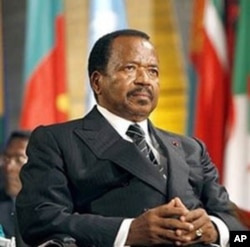The policy U-turn comes three weeks before the end of the national voter registration drive. It was embraced by the party’s national executive committee at a recent weekend session. Officials say the decision was taken because the government has met some of the demands contained in an 11-point party memorandum issued about a year ago.
In the document, the SDF suggested a two-round ballot, the granting of voting rights to Cameroonians living abroad, the computerization of voter registers and an overhaul of the electoral board, dubbed Elections Cameroon or ELECAM, among others.
The party threatened to boycott, and possibly disrupt the election, if its demands for reforms were not met.
The government responded by appointing members of civil society to ELECAM, which the opposition in general denounces as being filled with militants from the ruling party, the Cameroon Peoples’ Democratic Party, CPDM. It also adopted a law permitting Cameroonians living abroad to vote.
SDF leaders agree that many of the reforms have not been met, but argue that it is important to participate in the presidential poll constitutionally set for October this year.
Abel Elimbi Lobe, the vice president of the party’s electoral committee, said the decision by the government to include civil society in the electoral board as well as grant voting rights to Cameroonians abroad are major factors shaping the change in strategy. According to Lobe, participating in the poll will give the party the chance to denounce flaws intended to continue incumbent President Paul Biya’s grip on power.
Global democracy watchdogs say elections in Cameroon are frequently marred by fraud and a lack of transparency. Seventy-eight-year-old President Biya has ruled the country since 1982. He is expected to seek another mandate, though his candidacy is still to be confirmed. In 2008, the government scrapped term limits, enabling him to run for life. The United States has urged the government to conduct a free and fair election.
But Biya’s opponents say he should not be allowed to stand. The opposition Union of Peoples of Cameroon has announced it is boycotting the election. Its leader, Samuel Mackit, says ELECAM is a tool of the president and cannot guarantee a transparent poll.
Mackit said there needs to be a neutral body to manage the election and ensure credibility. He said participating in the election would mean validating Biya’s "unlawful" rule. He sees several signs of vote manipulation including the scrapping of term limits from the constitution, the involvement of government officials in the electoral process and the annoucment that the government and not ELECAM would proclaim the results.
Others in the opposition are also critical. Abanda Kpama, a leader of the Movement for Africa’s New Independence and Democracy, said the SDF has a problem "sticking to its strategies and has once again completely contradicted itself."
He called the move "another indication of political immaturity within the opposition which has frequently failed to join forces against President Biya over the past 30 years." He said the failure to form a united front has led to a significant drop in the number of opposition members in the National Assembly and local councils.
But SDF officials argue that after careful contemplation, they agreed it would have been wrong to deprive millions of activists of their right to vote and have a say in determining the fate of the country. SDF Member of Parliament Jean Michel Nitcheu said militants will be mobilized to register to vote over the next three weeks and support the party’s candidate.
ELECAM says so far, the total number of voters enrolled stands at 7,5, less than half of the country’s 20 million inhabitants. Its target is nine million and officials are hoping that the SDF’s decision to shift gears will bring in more voters.




